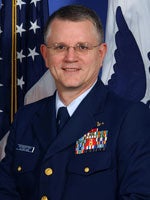Rear Admiral William D. Baumgartner ’94 gave the closing remarks at the Harvard National Security and Law Association symposium on immigration and national security on April 3. His talk capped a day of panel discussions on immigration reform, border security and international cooperation and information sharing.
Baumgartner, the Judge Advocate General and Chief Counsel of the United States Coast Guard, said that new requirements for intelligence officers to work in more than one intelligence service over a career will provide the breadth of experience necessary to increase interagency trust and cooperation. It’s a “slow process,” he said, but necessary “to change people’s minds,” and “change the way they think.”
He called the Coast Guard a “unique instrument of national security” and said, “We do immigration enforcement and maritime border security, we’re part of the intelligence community” and are active internationally. If it were a navy, he said, the Coast Guard would be the 7th or 8th largest in the world.
The Coast Guard is an armed force, but because it has an important humanitarian mission and isn’t part of the Department of Defense, it can go to places like Russia and China, where other U.S. armed forces cannot. To carry out sensitive missions like boarding ships, inspecting cargoes and countering terrorism, Baumgartner said, the Coast Guard evaluates, in each situation, what authority, capacity, competence and partners are available. Of finding and working with international partners, he said, “That’s our life.”
Baumgartner praised the Obama administration’s more “engaged” and “humble” approach to international relations. Turning to his own specific arena, he advocated the ratification of the Law of the Sea Convention, “one of the most widely ratified conventions on the face of the earth,” to show that the U.S. seeks long-term international partnerships and is part of “the recognized fabric of the international community.”
